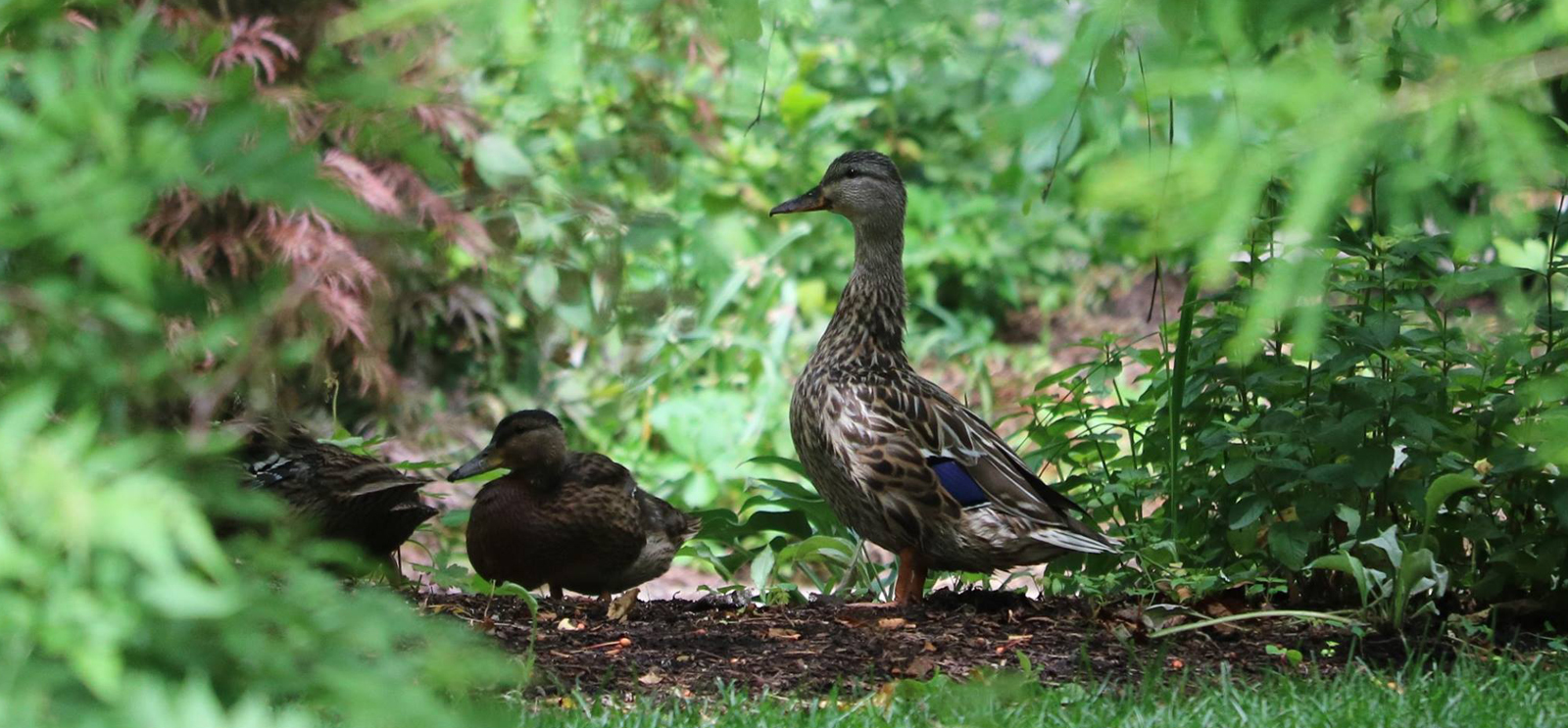Since May, Sid Colton, AB’89, has documented the trials and tribulations of growing up duckling on the Facebook group “Overheard at UChicago.” (Photography by Sid Colton, AB’89)
The ducks of Botany Pond
Sid Colton, AB’89, is writing a duckling bildungsroman, one Facebook post at a time.
Take a late springtime stroll around Botany Pond, and among the lily pads, shrubbery, and painted turtles you’re sure to find newborn Anas platyrhynchos waddling about. On a photo-friendly day, duck enthusiast Sid Colton, AB’89, won’t be far behind. Following the waterfowl of Botany Pond has become a daily pastime for the recently retired Colton. Since May he’s documented the trials and tribulations of growing up duckling on the Facebook group “Overheard at UChicago.”
This year, two mallard families called Botany Pond home: the first hatched around May 15, the second on June 29. Colton named the mothers Edith and Grace Abbot, respectively, after the founding sisters of the School of Social Service Administration, where he had worked as the production room manager for 24 years. Announcing the arrival of the second family in a post that received 229 “likes,” Colton declared that the new motto of UChicago would now and forever be Crescant anates; vita excolatur! (Let ducks grow from more to more; and so be human life enriched!)
[[{"type":"media","view_mode":"media_original","fid":"3667","attributes":{"alt":"","class":"media-image","height":"372","typeof":"foaf:Image","width":"500"}}]] “Do you know that University of Chicago ducks when young, are so smart that that they learn to walk on water for later in life by practicing their walking on lily pads in Botany Pond?”—Sid Colton, AB’89 (Photography by Sid Colton)
But the possibility of peaceful cohabitation was short-lived. After quarreling with the bigger ducklings, the younger family was forced out in just two days. On July 1 Colton posted a Facebook video of Grace Abbot Duck valiantly defending her flock by chasing away one of the six “teenage” ducks she had determined was trying to sneak up on them. The next day Grace and her wee webbed ones were nowhere to be found.
“There’s a history of ducks looking for places to live,” Colton explained, pulling out a large copy of Make Way for Ducklings, a beloved 1941 children’s book that follows a mother mallard and her offspring on their journey throughout Boston to find a suitable body of water to call home. After the Grace Abbot family departed, Colton kept an eye out for them and urged others to report any sightings on Overheard. The ducks were spotted only once, on July 16, near Kenwood Park on East 49th Street. Colton led a search party the next day, but to no avail; the ducklings and their mother seemed to be wandering aimlessly around Hyde Park.
The older family, on the other hand, was content to remain at Botany Pond. Basking in the admiration of onlookers, the ducklings passed their lazy summer afternoons swimming among the fish, ruffling each other’s feathers, and sunbathing on the concrete bank. But it wasn’t always sunshine and rainbows—Colton chronicled the ups and downs of the ducklings’ adolescence. He narrated the troubling diminution of the brood, when 12 became six; the nuisance of dragonflies; bathing rituals; mid-day exercises; and one “college-age” duckling’s studies observing a butterfly near the Zoology Building. By late July, as the ducklings grew to be nearly indistinguishable from their mother, Colton’s updates slowed.
But Colton, who’s been observing the Botany Pond ducks since the ’80s, does not intend to give up his sweeping saga anytime soon. The Edith Abbot Duck family will migrate south before the winter winds befall Botany Pond, but come spring—and a new clutch of ducklings—our narrator will likely be at it again. In the meantime, he’s joined dog- and cloud-spotting groups and is volunteering in the Hyde Park community; he now serves on the advisory council for the Bixler Playlot on 57th Street and Kenwood. “I tell people, ‘Oh yeah, my political career has started,’” Colton quipped. “But it doesn’t matter if it doesn’t go beyond writing captions and putting pictures of ducks on Facebook.”

